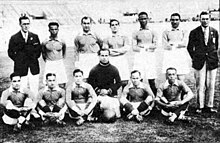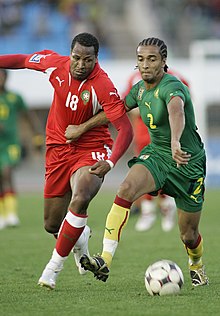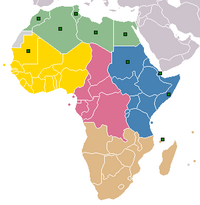Portal:Football in Africa
Introduction
Football is the most popular sport in Africa, alongside basketball. Indeed, football is probably the most popular sport in every African country, although rugby and cricket are also very popular in South Africa. The first football stadium to be built in Africa was the Alexandria Stadium in 1929.
The English Premier League is the most popular sports league in Africa. The most popular clubs in Africa are Arsenal, Chelsea and Manchester United. (Full article...)
This section may be unbalanced toward certain viewpoints. (October 2022) |

Selected article -
The African Nations Championship, known for sponsorship purposes as the TotalEnergies African Nations Championship and commonly abbreviated as CHAN, is a biennial African association football tournament organized by the Confederation of African Football (CAF) since 2009 and first announced in September 2007. The participating nations must consist of players playing in their national league competitions.
The DR Congo and Morocco are the most successful teams in this tournament with two titles each, followed by Tunisia, Libya and incumbent champions Senegal with one title each. The tournament began life in 2009 with 8 teams, which was doubled for the 2nd edition up until the 6th and is currently contested by 18 teams since the 2022 edition.
Since the 2014 edition, matches of every edition of this tournament from qualification to the final will be computed to calculate the forthcoming FIFA World Rankings following its conclusion, which CAF exclaimed at the time as an important step for the competition's development. At the time, FIFA considers the tournament friendly since it is restricted to players from local leagues to participate. The tournament is held biennially and alternates with the Africa Cup of Nations.
Selected biography -
Lakhdar Belloumi (Arabic: لخضر بلومي; born on 29 December 1958) is an Algerian former football player and manager. A former attacking midfielder, he is widely considered the best Algerian player of all time and one of the best players in Africa. He is said to have invented the "Blind Pass". He was named the fourth-best African player of the century by IFFHS. He holds the record as the most capped Algerian player with 100 national caps (147 caps not recognized by FIFA) and is also the third best goalscorer of the Algerian national team in all time with 28 goals (34 goals not recognized by FIFA).
Belloumi's goal against reigning European champions West Germany earned Algeria a stunning 2–1 victory in their World Cup debut in Spain '82.
Selected image -
 |
A public bus in Nairobi, Kenya bearing the name of Spanish footballer Diego Costa, pictured on 17 August 2014. Football in Kenya is controlled by the Football Kenya Federation (FKF), and the nation became a member of FIFA in 1960, prior to their independence in 1963.
Subcategories
Related portals
More sports portals
WikiProjects
Related task forces and sub-projects
African football task force
WikiProject Africa • WikiProject Football
WikiProject Football task forces and sub-projects
 | |
| Wikipedia ads | file info – #250 |
Topics
Open tasks

- Expand stubs: Competitions in Africa • Organizations
- Expand club articles of teams from Africa.
- Expand biographies of Africans involved in football.
- Create: Requested articles • Most wanted football articles • Requested general football articles
- Add: Infoboxes • Images (General requests, Requested images of people)
- Review: articles currently under review
- Assess: Assessment requests • Assess an article
- Revert vandalism on this portal and on African football articles
- Assist in maintaining this portal and keeping its selected content up to date.
- WikiNews: Create and submit news stories about African football for Wikipedia's sister project WikiNews.
Associated Wikimedia
The following Wikimedia Foundation sister projects provide more on this subject:
-
Commons
Free media repository -
Wikibooks
Free textbooks and manuals -
Wikidata
Free knowledge base -
Wikinews
Free-content news -
Wikiquote
Collection of quotations -
Wikisource
Free-content library -
Wikiversity
Free learning tools -
Wiktionary
Dictionary and thesaurus
More portals
Sources

- ^ "The History Of Soccer In Africa". NPR.org. 2010-06-09. Retrieved 2016-03-31.
- ^ a b c Alegi, Peter (2010). African Soccerscapes. Ohio University Press. pp. 1–2. ISBN 9780896802780.
- ^ Frimpong, Enoch Darfah. "Ghana news: A world of superstition, frustration and disillusionment - Graphic Online". Retrieved 23 September 2017.
- ^ Lacey, Marc (8 August 2002). "Kangemi Journal; For Spellbinding Soccer, the Juju Man's on the Ball". The New York Times. NY Times. Retrieved 2016-03-31.
- ^ "World Cup Witchcraft: Africa Teams Turn to Magic for Aid". National Geographic. Archived from the original on July 10, 2006. Retrieved 2016-03-31.
- ^ Andy Mitten (September 2010). The Rough Guide to Cult Football. Rough Guides UK. ISBN 9781405387965. Retrieved 2016-04-02.
- ^ "African Nations Cup overshadowed by hocus pocus | Football". The Guardian. Retrieved 2016-04-09.
- ^ Kuper, Simon (2006). Soccer Against the Enemy: How the World's Most Popular Sport Starts and Stops Wars, Fuels Revolutions, and Keeps Dictators in Power. Nation Books. p. 123. ISBN 978-1-56025-878-0.

























